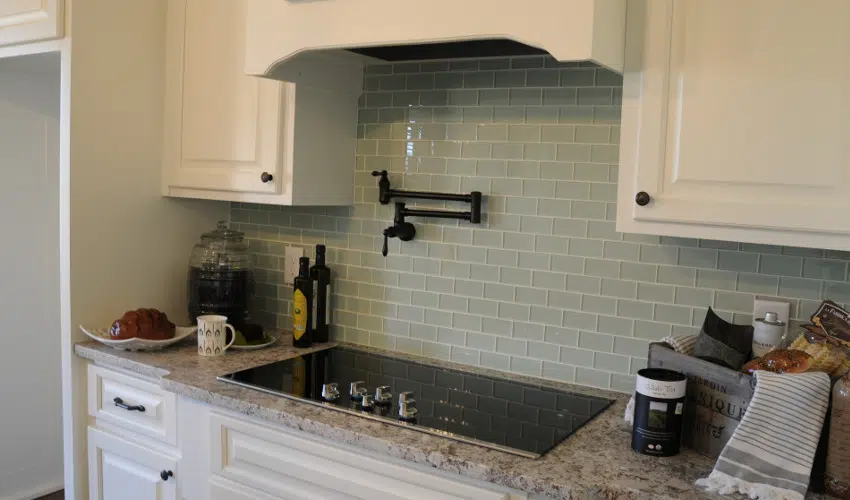
Protecting your tile and stone flooring investment starts with proper care and maintenance. At The Flooring Specialist, we want your Warner Robins, Macon, or Middle Georgia tile floors to maintain their beauty for decades. While tile and stone are remarkably durable and low-maintenance, following proper care guidelines ensures they look stunning year after year.
This comprehensive tile and stone maintenance guide covers everything you need to know about cleaning, protecting, and maintaining your tile floors. Whether you have ceramic tile, porcelain tile, or natural stone flooring, these expert tips will help preserve your floor's original beauty and extend its lifespan.
Daily and Weekly Tile Floor Maintenance
Regular Cleaning Prevents Damage
The foundation of tile and stone care is consistent, gentle cleaning that removes dirt and grit before it can scratch tile surfaces or wear down grout lines.
Daily Maintenance:
- Sweep tile floors daily in high-traffic areas using a soft-bristle broom
- Use a microfiber dust mop to capture fine dust and particles
- Wipe up spills immediately to prevent staining, especially on natural stone
- Remove tracked-in dirt and debris before it spreads throughout your home
Weekly Maintenance:
- Sweep or vacuum all tile floor areas thoroughly
- Damp mop tile floors using appropriate cleaning solutions
- Clean high-traffic areas more frequently (2-3 times per week)
- Address any spills or spots that have accumulated during the week
Proper Vacuuming Technique
When vacuuming tile floors, use the hard floor setting or attachment. Avoid using beater bars on tile, as they're unnecessary and can damage grout over time. Many modern vacuums include specific hard surface settings that provide optimal cleaning without risk.
How to Clean Tile and Stone Floors Properly
Immediate Spill Management
Quick response to spills prevents stains and protects your tile and stone surfaces.
For All Spills:
- Wipe liquid spills immediately with a clean, absorbent cloth
- Blot rather than wipe to prevent spreading
- Clean the area with appropriate tile cleaner after removing the spill
- Rinse with clean water and dry thoroughly
Spill Prevention:
- Use coasters under beverages
- Place mats under pet food and water bowls
- Use cutting boards and trivets in kitchen areas
- Clean up cooking spills immediately
Damp Mopping Technique
Regular damp mopping keeps tile and stone floors looking their best.
Proper Mopping Method:
- Sweep or vacuum thoroughly first to remove loose dirt and debris
- Fill a bucket with warm water and add the recommended amount of pH-neutral tile cleaner
- Dip a clean mop into the solution and wring it out well (the mop should be damp, not soaking wet)
- Mop the floor in sections, working from the farthest point toward the exit
- Change water when it becomes dirty
- Rinse the floor with clean water if the cleaner requires it
- Allow the floor to air dry, or dry with a clean towel for immediate use
Mopping Frequency:
- High-traffic areas (kitchens, entryways): 2-3 times per week
- Medium-traffic areas (bathrooms, hallways): Once per week
- Low-traffic areas (bedrooms, formal dining rooms): Every 2 weeks
Choosing the Right Tile Cleaner
Using the proper cleaning products is critical for maintaining tile and stone floors.
Best Cleaners for Tile and Stone:
pH-Neutral Cleaners - The safest choice for all tile and stone types. These cleaners effectively remove dirt without damaging surfaces or grout.
Tile-Specific Products - Choose cleaners specifically formulated for your tile type:
- Ceramic and porcelain tile cleaners
- Natural stone cleaners (for marble, granite, travertine, slate, limestone)
- Grout cleaners for deep cleaning grout lines
Manufacturer-Recommended Products - We can recommend specific cleaning products that work best with your tile installation. Ask your Flooring Specialist sales associate for guidance on the right products for your floors.
Deep Cleaning Tile Floors
Monthly Deep Cleaning:
Beyond regular mopping, tile floors benefit from periodic deep cleaning:
- Sweep or vacuum thoroughly
- Mix a stronger solution of pH-neutral tile cleaner (follow product instructions)
- Apply cleaner to the floor and allow it to dwell for several minutes
- Scrub grout lines with a soft-bristled brush if needed
- Mop the entire floor thoroughly
- Rinse with clean water
- Dry completely
Steam Cleaning Option:
For ceramic and porcelain tile (not natural stone), steam cleaning provides deep sanitization without chemicals. Steam cleaners use high-temperature vapor to clean and disinfect tile surfaces and grout lines effectively.
Note: Avoid steam cleaning natural stone floors, as excessive heat and moisture can damage some stone types.
What NOT to Use on Tile and Stone Floors
Avoiding harmful cleaning products protects your tile and stone investment. Many common household cleaners can permanently damage tile surfaces and grout.
Never Use These Products:
Acidic Cleaners - Acids etch and dull tile surfaces, especially natural stone. Never use:
- Vinegar (despite popular home remedies, vinegar damages grout and stone)
- Lemon juice or citrus-based cleaners
- Toilet bowl cleaners
- Rust removers with acid content
Alkaline Cleaners - Strong alkaline products damage grout and can discolor tile:
- Ammonia-based cleaners
- Bleach (damages grout and discolors colored grout)
- Strong degreasers
Harsh Chemicals - Avoid cleaners containing:
- Chlorine
- Bleach (except for occasional targeted grout cleaning in well-ventilated areas)
- Phosphoric acid
- Hydrochloric acid
- Strong solvents
Improper Cleaning Agents:
- Dish soap or detergent (leaves residue that attracts dirt and promotes mildew)
- Oil-based cleaners (create slippery, sticky residue)
- Wax or polish products (build up and dull tile surfaces)
- All-purpose cleaners not specifically designed for tile
Avoid These Cleaning Tools:
Abrasive Scrubbers - Scratch and dull glazed tile surfaces:
- Steel wool
- Scouring pads (except non-abrasive types)
- Hard-bristle brushes on tile surfaces (soft brushes are fine for grout)
- Abrasive powders or cleansers
Improper Equipment:
- Dirty mops (always use clean mops to avoid spreading dirt)
- Excessive water (can penetrate grout and cause damage)
Special Care for Natural Stone Flooring
Natural stone requires additional care considerations beyond ceramic and porcelain tile.
Understanding Your Stone Type
Different natural stones have different maintenance requirements:
Marble - Highly susceptible to acid damage and etching. Requires regular sealing and immediate spill cleanup.
Granite - Very durable and acid-resistant. Lower maintenance than marble but still benefits from sealing.
Travertine - Porous and acid-sensitive. Requires sealing and gentle cleaning.
Slate - Durable but porous. Needs sealing to prevent staining.
Limestone - Soft and very acid-sensitive. Requires careful maintenance and regular sealing.
Quartzite - Very hard and durable. Moderate maintenance requirements.
Stone-Specific Maintenance Tips
Use Only Stone-Safe Cleaners - Never use acidic or alkaline products on natural stone. Choose pH-neutral cleaners specifically formulated for natural stone.
Seal Regularly - Most natural stone requires periodic sealing to prevent staining:
- High-traffic areas: Every 6-12 months
- Moderate-traffic areas: Every 12-18 months
- Low-traffic areas: Every 18-24 months
Test sealers in inconspicuous areas first and follow manufacturer instructions.
Immediate Spill Response - Natural stone is porous and can stain quickly. Wipe spills immediately, especially:
- Wine and juice
- Coffee and tea
- Cooking oils
- Acidic foods (tomatoes, citrus)
- Cleaning products
Polish When Needed - Polished stone surfaces may develop a dull appearance over time. Professional stone polishing restores luster.
Grout Maintenance and Care
Grout requires specific attention to maintain its appearance and integrity.
Regular Grout Cleaning
Weekly Maintenance:
- Include grout lines in regular mopping
- Use pH-neutral cleaner safe for grout
- Wipe up spills from grout immediately
Monthly Deep Cleaning:
- Apply grout cleaner specifically formulated for grout
- Allow cleaner to penetrate for recommended time
- Scrub grout lines with soft-bristled grout brush
- Rinse thoroughly with clean water
- Dry completely
Grout Sealing
Sealing grout lines prevents staining and moisture penetration.
When to Seal Grout:
- Initial sealing: Wait 48-72 hours after installation for grout to cure completely
- Resealing schedule:
- High-traffic areas: Every 6-12 months
- Moderate-traffic areas: Every 12-18 months
- Low-traffic areas: Every 18-24 months
- Wet areas (showers, tub surrounds): Annually
How to Seal Grout:
- Clean grout lines thoroughly and allow to dry completely (24 hours)
- Apply grout sealer according to manufacturer instructions
- Use a small brush or applicator for precision
- Wipe excess sealer from tile surfaces immediately
- Allow proper curing time before exposing to water (typically 24-48 hours)
- Apply a second coat if recommended by manufacturer
Addressing Stained or Discolored Grout
Light Stains:
- Clean with grout-specific cleaner
- Scrub with soft-bristled brush
- Rinse thoroughly
Stubborn Stains:
- Use oxygen bleach-based grout cleaner
- Apply and allow to penetrate
- Scrub and rinse
- Reseal after cleaning
Severe Discoloration:
- Consider professional grout cleaning
- Grout dyeing/coloring for uniform appearance
- Grout replacement in worst areas
Protecting Your Tile and Stone Floors
Use Quality Entry Mats
Prevention is the most effective tile maintenance strategy. Place high-quality mats at all entryways.
Mat Selection Guidelines:
- Choose mats large enough to capture several steps
- Use mats both inside and outside exterior doors
- Select mats with non-slip backing
- Clean mats regularly to maintain effectiveness
- Replace worn mats promptly
Quality entry mats prevent dirt, sand, grit, moisture, and debris from reaching your tile floors, dramatically reducing wear and cleaning requirements.
Install Furniture Floor Protectors
Protect tile from scratches and chips caused by furniture movement.
Floor Protection Best Practices:
- Attach felt pads to the bottom of all furniture legs
- Use furniture coasters under heavy pieces
- Replace worn felt pads regularly
- Use furniture cups under very heavy items like pianos
Protect Floors When Moving Furniture
Moving furniture requires special care on tile floors.
Safe Furniture Moving Procedure:
- Never drag or slide furniture across tile floors
- Use furniture dollies or sliders designed for hard surfaces
- Lay cardboard or moving blankets to create protective pathways
- Lift furniture completely when possible
- Have adequate help to safely maneuver heavy pieces
Use Rugs in High-Traffic Areas
Strategic rug placement protects tile in busy areas:
- Hallways and traffic paths
- In front of sinks and stoves
- Under dining tables
- At workstations and desks
Choose rugs with non-slip backing or use rug pads to prevent slipping.
Preventing Scratches and Damage
Watch Your Footwear
Certain footwear can scratch or chip tile surfaces.
Remove or Avoid:
- High heels with damaged tips exposing metal
- Shoes with embedded stones or sharp debris
- Cleats or athletic shoes with spikes
- Work boots with attached gravel or debris
Create a household policy of removing potentially damaging footwear at entryways.
Keep Pet Nails Trimmed
Long pet nails can scratch glazed tile surfaces and damage grout.
Pet Care for Tile Floors:
- Trim pet nails every 2-4 weeks
- Use nail grinders for smoother nail edges
- Place rugs in areas where pets frequently play
- Wipe pet paws after outdoor activities
Avoid Dropping Heavy or Sharp Objects
While tile is extremely durable, heavy dropped objects can crack or chip tiles. Use caution when:
- Moving heavy pots and pans
- Handling tools and equipment
- Moving furniture or appliances
- Working with heavy decorative items
Seasonal Tile Maintenance
Spring and Summer Care
- Increase cleaning frequency due to higher foot traffic
- Address tracked-in pollen, grass, and outdoor debris
- Clean outdoor tile areas (patios, porches) thoroughly
- Check grout condition and reseal if needed
Fall and Winter Care
- Place additional mats at entryways to capture moisture, salt, and debris
- Wipe up snow melt and moisture immediately
- Avoid tracking in road salt, which can damage grout
- Clean floors more frequently during wet weather
- Check for water damage around entryways
Addressing Common Tile Problems
Cracked or Chipped Tiles
- Replace individual damaged tiles promptly to prevent water penetration
- Contact The Flooring Specialist for professional tile repair
Loose Tiles
- Address loose tiles immediately to prevent further damage
- Loose tiles indicate adhesive failure requiring professional repair
Grout Cracks or Gaps
- Remove old grout and regrout affected areas
- Investigate causes of grout failure (structural movement, improper installation, inadequate curing)
Efflorescence (White Powder on Tile or Grout)
- Clean with appropriate efflorescence remover
- Address moisture source causing the problem
- May indicate water penetration issues requiring professional assessment
Dull or Hazy Appearance
- Often caused by cleaning product buildup
- Strip old residue with appropriate tile stripper
- Rinse thoroughly and return to pH-neutral cleaner
When to Call Professionals
Some tile maintenance tasks require professional expertise:
Professional Services:
- Deep grout cleaning and restoration
- Tile and grout sealing for large areas
- Natural stone polishing and refinishing
- Cracked or loose tile repair
- Grout color restoration or dyeing
- Water damage assessment and repair
- Tile replacement in large or complex areas
Tile and Stone Maintenance Products
The Flooring Specialist can recommend high-quality maintenance products for your specific tile type:
Recommended Product Types:
- pH-neutral tile and stone cleaners
- Grout cleaners and sealers
- Natural stone sealers
- Grout brushes and cleaning tools
- Microfiber mops and cleaning cloths
Visit our Warner Robins showroom or call for product recommendations specific to your flooring.
Tile Maintenance FAQs
How often should I clean my tile floors? Sweep daily in high-traffic areas. Damp mop high-traffic areas 2-3 times weekly, other areas weekly.
Can I use vinegar on tile floors? No. Despite popular recommendations, vinegar is acidic and damages grout and natural stone over time.
How do I know when to reseal grout? Test by placing a few drops of water on grout. If water absorbs quickly rather than beading up, resealing is needed.
What's the best way to clean grout? Use a pH-neutral grout cleaner with a soft-bristled brush. Avoid harsh chemicals and abrasive tools.
Can I use a steam mop on tile floors? Yes, for ceramic and porcelain tile. Avoid steam cleaning natural stone or using excessive moisture on any tile.
How do I remove soap scum from tile? Use a tile-specific soap scum remover or a mixture designed for your tile type. Regular cleaning prevents buildup.
Why does my tile look dull? Usually caused by cleaning product residue. Strip old buildup and switch to pH-neutral cleaner.
How long does grout sealer last? Typically 6-18 months depending on traffic levels. High-traffic areas need more frequent resealing.
Professional Tile Services in Middle Georgia
The Flooring Specialist offers comprehensive tile maintenance and repair services throughout Warner Robins, Macon, Byron, Perry, Fort Valley, and Middle Georgia:
Our Services Include:
- Professional tile and grout cleaning
- Grout sealing and color restoration
- Tile repair and replacement
- Natural stone polishing and sealing
- Maintenance consultations and product recommendations
- Complete tile restoration services
Contact The Flooring Specialist
Have questions about maintaining your tile and stone floors in Warner Robins, Macon, or Middle Georgia? The Flooring Specialist is here to help with expert advice, professional services, and quality maintenance products.
Call us today at (478) 922-7777 for tile and stone maintenance guidance, recommended cleaning products, professional cleaning services, or any flooring questions.
Your tile and stone floors are a valuable investment. Protect them with proper care and enjoy their lasting beauty for generations to come.
Serving Warner Robins, Macon, Byron, Perry, Fort Valley, and all of Middle Georgia with expert tile and stone maintenance advice, professional cleaning services, and quality care products.









